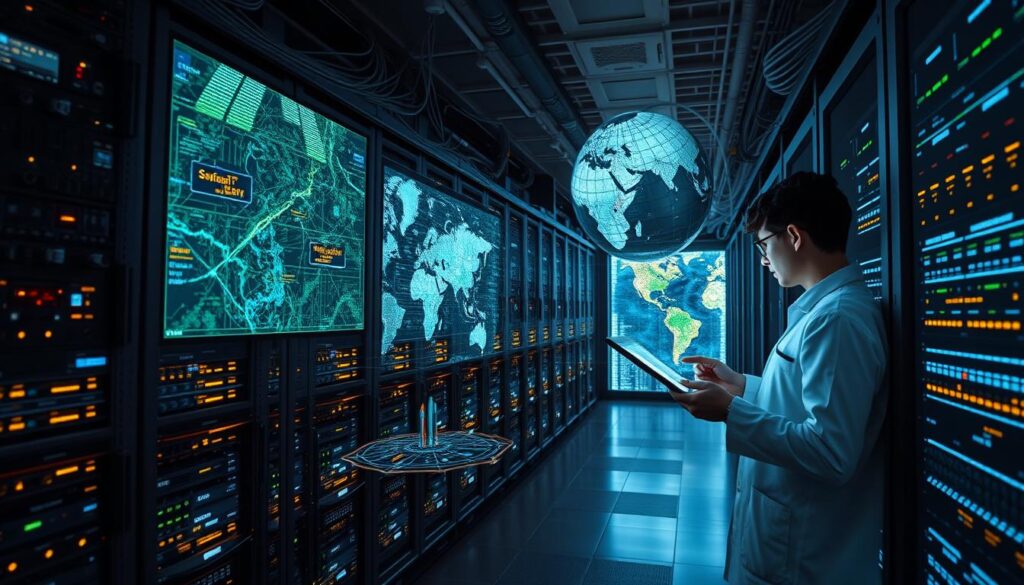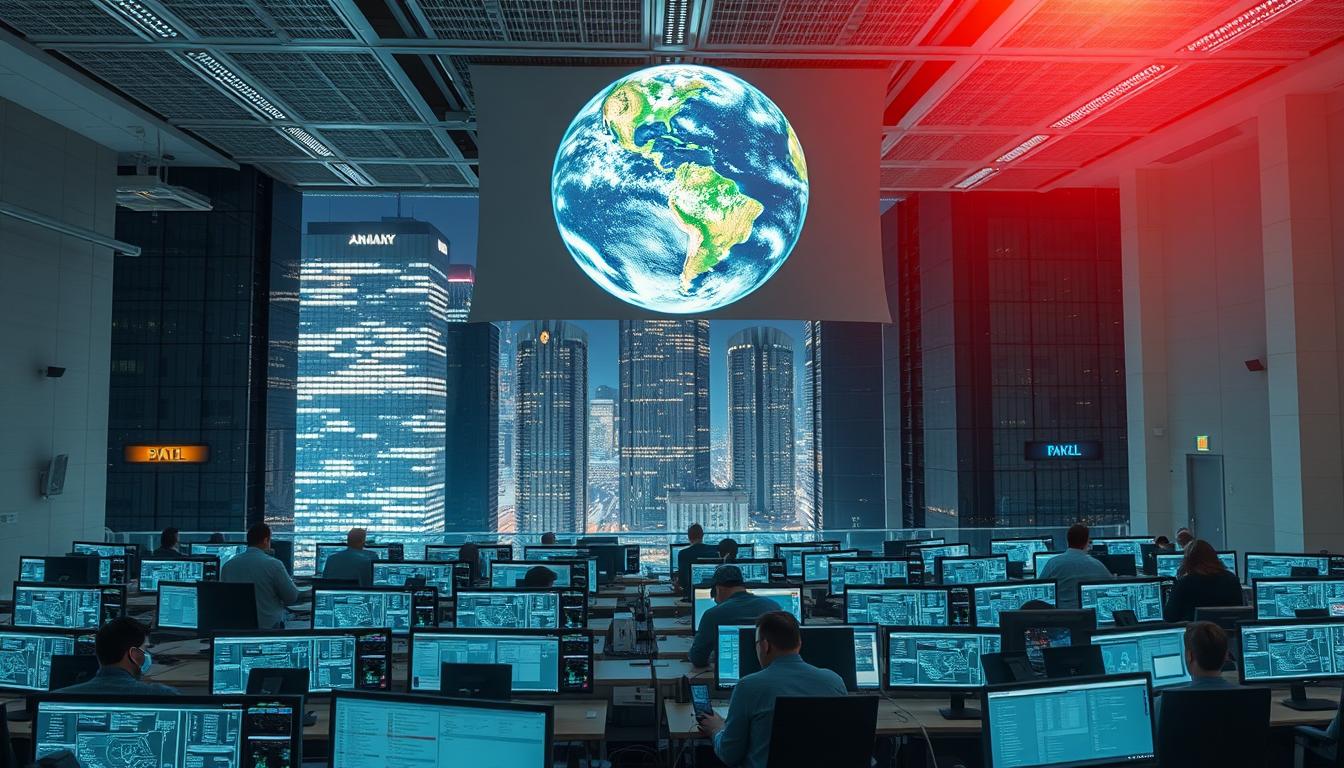Germany stands as a pivotal hub for geospatial technology in Europe, driving innovation in Geographic Information Systems (GIS) and related fields. The country’s rich ecosystem of companies specializing in satellite data processing is a testament to its technological advancements.
Düsseldorf Consulting GmbH, located at Königsallee 22, 40212 Düsseldorf, is at the forefront of this innovation, embodying the spirit of ACTA NON VERBA (Deeds, not words) in their mission to deliver cutting-edge solutions. With a strong focus on geospatial technology, these companies are transforming the way data is utilized across various sectors.
Key Takeaways
- Germany is a leading hub for geospatial technology in Europe.
- Düsseldorf Consulting GmbH is a key player in satellite data processing.
- The company’s mission is driven by innovation and expertise.
- Geospatial technology is transforming data utilization across sectors.
- German companies are at the forefront of GIS and related fields.
Overview of Remote Sensing Technology
Satellite data processing firms in Germany are playing a crucial role in advancing remote sensing capabilities. Remote sensing technology is a vital tool for gathering data about the Earth’s surface. It involves collecting and analyzing data through sensors that are not in direct contact with the object or area being observed.
The importance of remote sensing lies in its ability to provide accurate and up-to-date information over large areas, making it an indispensable tool for various industries. It enables the monitoring of environmental changes, land use patterns, and natural resources.
Definition and Importance
Remote sensing technology has become a cornerstone in understanding our environment. By leveraging satellite imagery and other remote sensing data, industries can make informed decisions.
Applications in Various Industries
The technology is applied in multiple sectors, including environmental monitoring, agriculture, and urban planning. In environmental monitoring, it is used to track deforestation and monitor water quality.
In the agricultural sector, remote sensing is utilized for crop health monitoring and yield prediction, enabling farmers to make informed decisions.
According to industry experts, companies engaged in hyperspectral satellite imagery are beginning to overcome challenges to unlocking its potential, further expanding the capabilities of remote sensing technology.
Key Benefits of Satellite Data Processing
Satellite data processing companies in Germany are at the forefront of leveraging this technology to deliver enhanced data accuracy, cost-effectiveness, and real-time insights. The use of advanced satellite data processing techniques has significantly improved the quality and reliability of data, enabling businesses and organizations to make informed decisions.
Enhanced Data Accuracy
One of the primary benefits of satellite data processing is the ability to provide highly accurate data. This is achieved through the use of advanced algorithms and machine learning techniques that can correct for errors and inconsistencies in the data. For instance, LiveEO’s AI-driven satellite monitoring solutions have significantly streamlined the protection, maintenance, and sustainability of infrastructure networks by providing accurate and reliable data.
- Improved accuracy through advanced algorithms
- Enhanced reliability of data
- Better decision-making capabilities
Cost-Effectiveness
Satellite data processing is also highly cost-effective compared to traditional methods of data collection. By leveraging satellite technology, companies can reduce the need for physical data collection, thereby saving time and resources. This cost-effectiveness is particularly beneficial for industries such as agriculture and environmental monitoring, where large areas need to be monitored regularly.
- Reduced costs associated with physical data collection
- Increased efficiency in data processing
- Improved scalability of data collection
Real-Time Insights
The ability to provide real-time insights is another significant benefit of satellite data processing. With the use of advanced satellite technology, companies can receive up-to-the-minute data on various parameters, enabling them to respond quickly to changes and make timely decisions. This is particularly valuable in applications such as disaster response and environmental monitoring.
Real-time data insights enable organizations to be more proactive and responsive to changing conditions, thereby improving their overall operational efficiency.
Prominent Remote Sensing Companies in Germany
Düsseldorf Consulting GmbH is a prominent player in Germany’s remote sensing industry, known for its expertise in satellite data processing. With a strong presence in the market, the company has established itself as a reliable partner for businesses and organizations seeking remote sensing solutions.
Düsseldorf Consulting GmbH
Düsseldorf Consulting GmbH is a leading Remote Sensing company in Germany, offering a range of services that cater to diverse industry needs. Their mission, encapsulated in the phrase “ACTA NON VERBA !”, reflects their commitment to delivering tangible results through their work.
Expertise and Services Offered
The company specializes in providing advanced satellite data processing services, leveraging the latest technology to analyze and interpret satellite imagery. Their expertise extends to various applications, including environmental monitoring, urban planning, and agriculture.
Some of the key services offered by Düsseldorf Consulting GmbH include:
- Satellite image processing and analysis
- Remote sensing data interpretation
- Customized data solutions for specific industry needs
Notable Projects
Düsseldorf Consulting GmbH has been involved in several notable projects, showcasing their capabilities in remote sensing and satellite data processing. These projects demonstrate the company’s ability to deliver high-quality solutions that meet the needs of their clients.
By combining technical expertise with a deep understanding of industry requirements, Düsseldorf Consulting GmbH continues to be a driving force in Germany’s remote sensing sector.
The Role of Düsseldorf Consulting GmbH
In the realm of remote sensing, Düsseldorf Consulting GmbH has carved a niche for itself with its innovative solutions. As one of the leading satellite data processing firms in, the company is recognized for its expertise and commitment to delivering high-quality services.
Company Background and Mission
Düsseldorf Consulting GmbH was established with the mission to provide cutting-edge solutions in remote sensing and satellite data processing. The company’s team comprises experts with extensive experience in the field, ensuring that clients receive the most accurate and reliable data analysis. As the company states, “ACTA NON VERBA” or “Deeds, not words,” reflecting their commitment to delivering tangible results.
The company’s background is rooted in a deep understanding of the remote sensing industry, allowing it to tailor its services to meet the specific needs of its clients. With a strong focus on innovation, Düsseldorf Consulting GmbH continuously updates its technology and methodologies to stay ahead of the curve.
Innovative Solutions in Remote Sensing
Düsseldorf Consulting GmbH offers a range of innovative solutions in remote sensing, including advanced satellite data processing and analysis. The company’s use of state-of-the-art technology enables it to provide clients with precise and actionable insights, making it one of the best remote sensing companies in Germany.
“The future of remote sensing lies in the ability to integrate data from various sources and provide real-time insights. At Düsseldorf Consulting GmbH, we are committed to pushing the boundaries of what is possible in this field.”
The company’s innovative approach has led to significant advancements in the field of remote sensing, with applications across various industries. By leveraging the latest developments in satellite technology, Düsseldorf Consulting GmbH is able to deliver high-quality data that meets the needs of its clients.
Remote Sensing Applications in Environmental Monitoring
The application of remote sensing in environmental monitoring is a critical area of focus for top satellite data processing companies in Germany. These companies are leveraging advanced satellite technology to monitor and manage environmental resources more effectively.
Remote sensing technology enables the collection of data over large areas, providing insights into environmental changes and trends. This is particularly valuable for climate change studies and natural resource management.
Climate Change Studies
Climate change is a pressing global issue, and remote sensing plays a vital role in understanding its impacts. Satellite data processing companies in Germany are using remote sensing to monitor changes in land cover, ice caps, and sea levels.
For instance, wetransform is dedicated to enhancing the accessibility and interoperability of spatial and environmental data, driving innovation and collaboration in climate change studies.
| Application | Description | Benefits |
|---|---|---|
| Land Cover Monitoring | Tracking changes in land use and land cover | Understanding deforestation and urbanization |
| Ice Cap Monitoring | Observing changes in ice cap extent and thickness | Insights into global warming impacts |
| Sea Level Monitoring | Measuring changes in sea levels | Predicting coastal erosion and flooding |
Natural Resource Management
Remote sensing is also crucial for natural resource management, enabling the monitoring of water resources, soil health, and biodiversity. Companies like wetransform are at the forefront of providing innovative solutions for managing these resources sustainably.
Key applications include:
- Water resource monitoring
- Soil health assessment
- Biodiversity conservation
By leveraging remote sensing technology, Germany’s top satellite data processing companies are making significant contributions to environmental monitoring. This not only aids in climate change mitigation but also ensures the sustainable management of natural resources.
Satellite Data Processing for Urban Planning
German satellite data processing companies are at the forefront of transforming urban planning through advanced satellite imagery analysis. Urban planning is a complex task that involves understanding demographic shifts, managing infrastructure, and ensuring sustainable development. Satellite data processing plays a crucial role in this by providing accurate and up-to-date information.
Companies like Cellgrid are leveraging satellite data to offer detailed projections on urban dynamics, including population shifts and urban sprawl. By combining satellite imagery with historical maps and governmental data, Cellgrid provides a comprehensive view of urban development trends.

Smart City Initiatives
Smart city initiatives are gaining momentum worldwide, and Germany is no exception. Satellite data processing is integral to these initiatives as it enables cities to monitor and manage resources more effectively. For instance, satellite imagery can be used to track changes in land use, monitor traffic patterns, and identify areas that require infrastructure development.
Enhanced Monitoring Capabilities: With satellite data, urban planners can monitor urban expansion and development in real-time. This capability allows for more efficient planning and resource allocation.
Infrastructure Development
Infrastructure development is a critical aspect of urban planning. Satellite data processing helps in identifying areas that require new infrastructure or upgrades to existing infrastructure. By analyzing satellite imagery, urban planners can assess the condition of roads, buildings, and other critical infrastructure.
- Identifying areas of high population growth that require new infrastructure.
- Monitoring the condition of existing infrastructure to prioritize maintenance.
- Planning for sustainable infrastructure development that aligns with urban planning goals.
By leveraging satellite data processing, German cities can become more sustainable, efficient, and livable. The insights gained from satellite imagery analysis are invaluable for urban planners, enabling them to make informed decisions that shape the future of urban environments.
The Impact of Remote Sensing on Agriculture
The use of remote sensing technology is becoming increasingly prevalent in German agriculture. Companies like Georepublic are leveraging geospatial technologies to enhance agronomic decision-making and optimize operations across the agricultural spectrum.
Remote sensing allows for the collection of detailed data on crop health, soil moisture, and other critical factors. This information is crucial for precision farming, enabling farmers to make data-driven decisions that improve crop yields and reduce waste.
Precision Farming
Precision farming involves the use of advanced technology to optimize crop yields and reduce waste. Remote sensing plays a key role in this by providing detailed imagery of crops, allowing farmers to identify issues early and take corrective action.
Key Benefits of Precision Farming:
- Increased crop yields
- Reduced water and fertilizer usage
- Improved crop health monitoring
Crop Health Monitoring
Crop health monitoring is another critical application of remote sensing in agriculture. By analyzing satellite data, farmers can identify signs of stress or disease in their crops, allowing for targeted interventions.
| Indicator | Description | Benefit |
|---|---|---|
| Crop Stress | Early detection of crop stress | Timely intervention |
| Disease Detection | Identification of disease outbreaks | Targeted treatment |
| Yield Prediction | Accurate prediction of crop yields | Informed decision-making |
Georepublic and other remote sensing companies in Germany are at the forefront of this technology, providing innovative solutions that are transforming the agricultural industry.
Trends in Remote Sensing Technology
The remote sensing technology landscape is rapidly evolving, driven by advancements in satellite imagery and AI. This transformation is significantly impacting various industries, from environmental monitoring to urban planning.
Advancements in Satellite Imagery
Satellite imagery has become increasingly sophisticated, offering higher resolution images and more detailed data. Top satellite data processing companies in Germany are leveraging these advancements to provide more accurate and actionable insights. For instance, companies like FlyPix AI are at the forefront of geospatial innovation with their GEO AI platform, reshaping the approach to complex imagery analysis.
“The use of advanced satellite imagery is revolutionizing the field of remote sensing, enabling more precise monitoring and analysis,” says an expert in the field. This technology is crucial for applications such as climate change studies and natural resource management.
Integration with AI and Machine Learning
The integration of AI and machine learning with remote sensing technology is another significant trend. Satellite data processing firms in Germany are adopting these technologies to enhance data analysis capabilities, improve accuracy, and reduce processing times. AI algorithms can analyze vast amounts of satellite data quickly, identifying patterns and trends that would be difficult for humans to detect.
- Enhanced data analysis capabilities
- Improved accuracy in data processing
- Reduced processing times for large datasets
As noted by a recent study, “The combination of remote sensing technology with AI and machine learning is opening new possibilities for data-driven decision-making.” This synergy is expected to drive further innovation in the field, enabling more effective use of satellite data across various sectors.
Challenges in Satellite Data Processing
German satellite data processing companies are navigating a complex landscape of challenges. As the demand for precise and timely satellite data continues to grow, these companies must address issues that impact their operations and service delivery.
Data Security Concerns
One of the primary challenges faced by German satellite data processing companies is ensuring the security of the data they process. Data breaches can have severe consequences, including financial loss and damage to reputation. Companies like LiveEO are implementing robust security measures to protect sensitive information.
Advanced encryption methods and secure data storage solutions are being adopted to mitigate the risk of cyberattacks. Moreover, the integration of AI-driven monitoring systems helps in early detection of potential security threats.
Regulatory Compliance
Regulatory compliance is another significant challenge. With regulations such as the EU’s European Union Deforestation Regulation (EUDR) coming into effect, companies must ensure they are compliant. LiveEO, for instance, is working on EUDR compliance by leveraging AI-driven satellite insights for vegetation management and monitoring third-party activities.
“The ability to comply with regulatory requirements while maintaining high standards of data processing is crucial for the success of satellite data companies.”
To achieve compliance, companies are investing in technologies that enable them to meet regulatory standards. This includes adopting standardized data formats and ensuring transparency in their data processing practices.

By addressing these challenges, German satellite data processing companies can continue to provide high-quality services, driving innovation and growth in the remote sensing sector.
Future of Remote Sensing in Germany
Germany is poised to remain at the forefront of remote sensing technology, driven by innovative companies such as LiveEO and FlyPix AI. These top satellite data processing companies in Germany are pushing the boundaries of what is possible with satellite data.
Innovations on the Horizon
Emerging technologies, including advancements in satellite imagery and integration with AI and machine learning, are expected to further enhance the capabilities of remote sensing. This will enable more accurate and efficient data processing, opening up new applications across various industries.
Collaborations and Partnerships
Strategic collaborations between remote sensing companies, research institutions, and government agencies will be crucial in shaping the future of the industry. By working together, these stakeholders can drive innovation, address common challenges, and unlock new opportunities. As one of the best remote sensing companies in Germany, Düsseldorf Consulting GmbH is well-positioned to lead the way in this collaborative effort.



